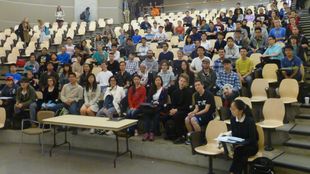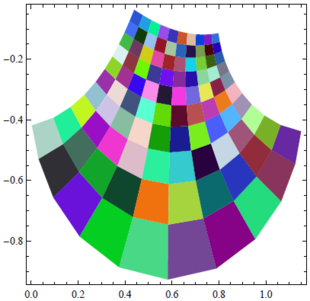Welcome to Math 240!
(additions to this web site no longer count towards good deed points)
|
| #
|
Week of...
|
Notes and Links
|
| 1
|
Sep 8
|
About This Class, What is this class about? (PDF, HTML), Monday, Wednesday
|
| 2
|
Sep 15
|
HW1, Monday, Wednesday, TheComplexField.pdf,HW1_solutions.pdf
|
| 3
|
Sep 22
|
HW2, Class Photo, Monday, Wednesday, HW2_solutions.pdf
|
| 4
|
Sep 29
|
HW3, Wednesday, Tutorial, HW3_solutions.pdf
|
| 5
|
Oct 6
|
HW4, Monday, Wednesday, Tutorial, HW4_solutions.pdf
|
| 6
|
Oct 13
|
No Monday class (Thanksgiving), Wednesday, Tutorial
|
| 7
|
Oct 20
|
HW5, Term Test at tutorials on Tuesday, Wednesday
|
| 8
|
Oct 27
|
HW6, Monday, Why LinAlg?, Wednesday, Tutorial
|
| 9
|
Nov 3
|
Monday is the last day to drop this class, HW7, Monday, Wednesday, Tutorial
|
| 10
|
Nov 10
|
HW8, Monday, Tutorial
|
| 11
|
Nov 17
|
Monday-Tuesday is UofT November break
|
| 12
|
Nov 24
|
HW9
|
| 13
|
Dec 1
|
Wednesday is a "makeup Monday"! End-of-Course Schedule, Tutorial
|
| F
|
Dec 8
|
The Final Exam
|
| Register of Good Deeds
|

Add your name / see who's in!
|

|
|
Knowledge about Fields:
During this lecture, we first talked about the properties of the real numbers. Then we applied these properties to the "Field". At the end of the lecture, we learned how to prove basic properties of fields.
The Real Numbers
Properties of Real Numbers
The real numbers are a set  with two binary operations:
with two binary operations:


such that the following properties hold.
- R1 :
 (the commutative law)
(the commutative law)
- R2 :
 (the associative law)
(the associative law)
- R3 :
 (existence of units: 0 is known as the
(existence of units: 0 is known as the
| "additive unit" and 1 as the "multiplicative unit")
- R4 :
 ;
;
|  (existence of inverses)
(existence of inverses)
- R5 :
 (the distributive law)
(the distributive law)
Properties That Do Not Follow from R1-R5
There are properties which are true for  , but do not follow from R1 to R5. For example (note that OR in mathematics denotes an "inclusive or"):
, but do not follow from R1 to R5. For example (note that OR in mathematics denotes an "inclusive or"):
 OR
OR  (the existence of square roots)
(the existence of square roots)
Consider another set that satisfies all the properties R1 to R5. In  (the rational numbers), let us take </math>a = 2</math>. There is no
(the rational numbers), let us take </math>a = 2</math>. There is no  such that
such that  , so the statement above is not true for the rational numbers!
, so the statement above is not true for the rational numbers!
Fields
Definition
A "field" is a set  along with a pair of binary operations:
along with a pair of binary operations:


and along with a pair  , such that the following properties hold.
, such that the following properties hold.
- F1 :
 (the commutative law)
(the commutative law)
- F2 :
 (the associative law)
(the associative law)
- F3 :
 (existence of units)
(existence of units)
- F4 :
 ;
;
|  (existence of inverses)
(existence of inverses)
- F5 :
 (the distributive law)
(the distributive law)
Examples
 is a field.
is a field. (the rational numbers) is a field.
(the rational numbers) is a field. (the complex numbers) is a field.
(the complex numbers) is a field. with operations defined as follows (known as
with operations defined as follows (known as  or
or  ) is a field:
) is a field:
More generally, for every prime number  ,
,  is a field, with operations defined by
is a field, with operations defined by
 .
.
An example:  , the operations are like remainders when divided by 7, or "like remainders mod 7". For example,
, the operations are like remainders when divided by 7, or "like remainders mod 7". For example,  and
and  .
.
Basic Properties of Fields
Theorem:
Let  be a field, and let
be a field, and let  denote elements of
denote elements of  . Then:
. Then:
 (cancellation law)
(cancellation law)
Proof of 1:
1. By F4,  .
We know that
.
We know that  ;
Therefore
;
Therefore  .
2. By F2,
.
2. By F2,  ,
so by the choice of
,
so by the choice of  , we know that
, we know that  .
3. Therefore, by F3,
.
3. Therefore, by F3,  .
^_^
Proof of 2: more or less the same.
.
^_^
Proof of 2: more or less the same.
3. If  is "like 0", then it is 0:
is "like 0", then it is 0:
If  satisfies
satisfies  , then 0' = 0.
, then 0' = 0.
4. If  is "like 1", then it is 1:
is "like 1", then it is 1:
If  satisfies that
satisfies that  , then 1' = 1.
, then 1' = 1.
Proof of 3 :
1. By F3 , 0' = 0' + 0.
2. By F1 , 0' + 0 = 0 + 0'.
3. By assumption on 0', 0' = 0 + 0' = 0.
^_^
5.  :
:
In any field " " makes sense because it is unique -- it has an unambiguous meaning.
" makes sense because it is unique -- it has an unambiguous meaning.
 the
the  such that
such that  .
.
6.  :
:
In any field, if  , "
, " " makes sense.
" makes sense.
Proof of 5 :
1.  .
2. By F1,
.
2. By F1,  .
3. By cancellation,
.
3. By cancellation,  .
^_^
.
^_^
7.  and when
and when  ,
,  .
.
Proof of 7 :
1. By definition,  . (*)
2. By definition,
. (*)
2. By definition,  .
3. By (*) and F1,
.
3. By (*) and F1,  .
4. By property 5,
.
4. By property 5,  .
^_^
.
^_^
Scanned Lecture Notes by AM
File:W121.pdf
File:W122.pdf

































































